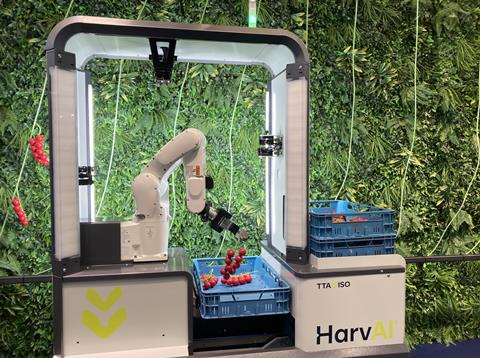TTA-ISO, the result of this year’s merger between Dutch firms ISO Horti and TTA, is seeing growing demand for its automation solutions, including for tomato plant grafting and robotic harvesting

For Netherlands-based TTA-ISO, automation represents the future of horticulture, empowering growers to boost productivity, yields and sustainability through solutions such as its advanced robotics and AI-driven systems.
“Nursery automation has been our main focus historically, but we are now also getting into automating other processes in both hi-tech and low-tech greenhouses,” reveals Ben Pieterse, sales manager food at TTA-ISO. “We do everything from ornamental plants and cut flowers to carbon and food crops. For food crops we have a large portfolio of machines available, the most important ones are: HarvAI, our tomato harvesting robot, the High Speed Grafter for young tomato, pepper and aubergine plants, our FlexSorter and MaxSorter machines, and several solutions for lettuce transplanting, sorting and harvesting.”
While some of these innovations are already being deployed, others are just on the cusp of commercialisation. The much-anticipated tomato harvesting robot, for example, is expected to hit the market in 2026.
“We only started just over three years ago, and there were already four or five companies working on this,” says Pieterse. “At first, we thought maybe it wasn’t worth entering the race. But we saw an opportunity thanks to our business case. Instead, TTA-ISO is betting on faster payback. It’s the only way it makes sense in this market. In horticulture, you need to be very competitive on the business case. So, it’s our pricing and speed through very, very good vision AI that are the key.”
And the company’s pricing model is set to reflect its confidence. “We’re looking at a combination of CapEx and pay-per-use,” says Pieterse. “That way, we show that we believe in the product.”
TTA-ISO’s reach is now global, with offices in the Netherlands, the US and Australia, and sales teams from Brazil to Asia. The only region where the company remains less active is Africa. However, demand for automation is increasing even in countries with lower labour costs.
“We see big demand for our grafting machine, for example,” says Pieterse. “We’re in talks in Mexico and Brazil, countries that also have low labour costs. For them it’s not really to reduce labour costs, it’s more about consistency and quality of labour and getting success rates up. The plants are so expensive – it’s such a high value crop – that any plant you lose is a big waste. People have different reasons for automating. Many people don’t realise how difficult grafting is. It’s such a skill to graft correctly, at speed and with consistency. And then if you lose your grafting workers, you’re in serious trouble. We can automate this process entirely.”
Ben Pieterse will be presenting at Fruitnet Tomato Congress, which takes place on 11-12 November in Malaga, Spain. Check out the full programme here.



